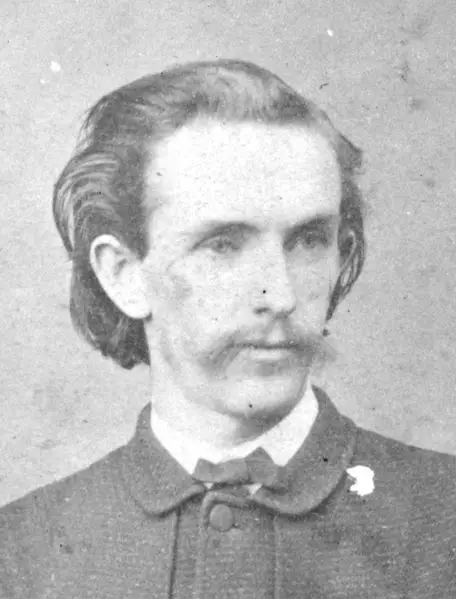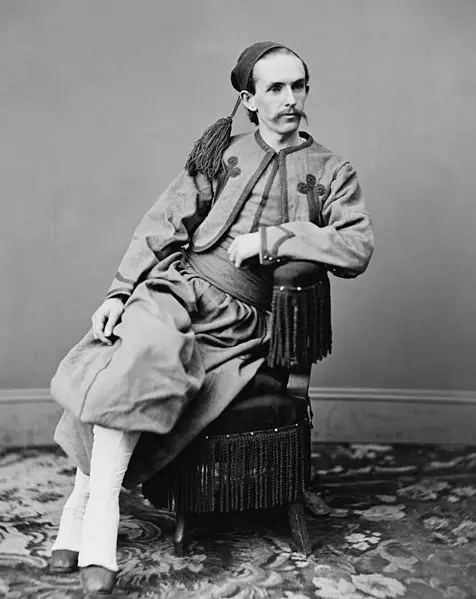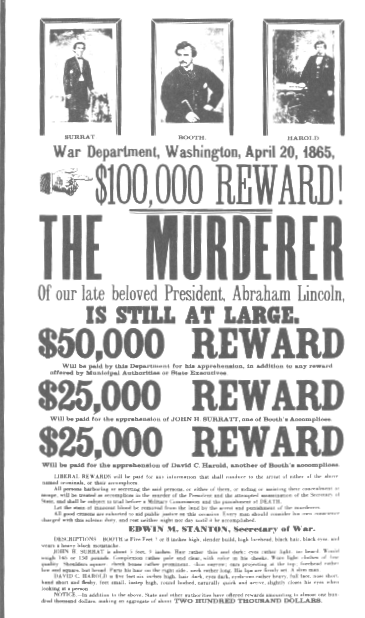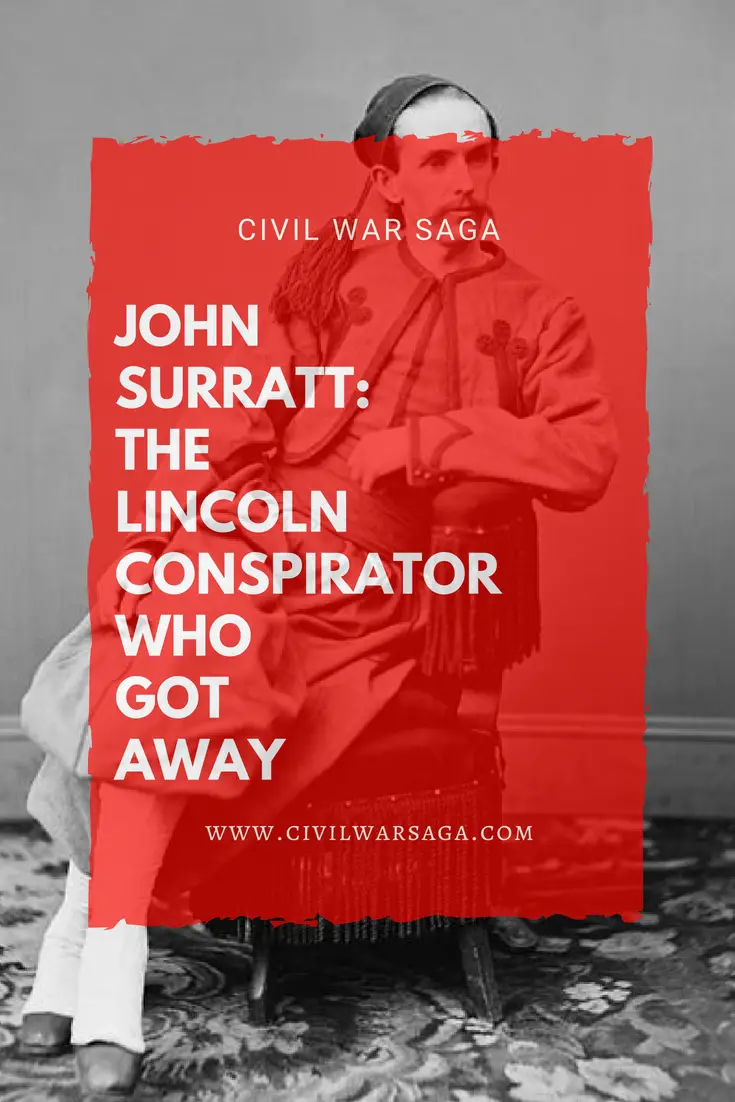John Surratt was the son of convicted Lincoln conspirator, Mary Surratt.
Unlike his mother and the eight other conspirators hanged for Abraham Lincoln‘s assassination, John escaped punishment for his role in the murder after his trial resulted in a mistrial.
John Surratt was working as a Confederate courier and spy during the Civil War when he was introduced to John Wilkes Booth by Dr. Samuel Mudd in December of 1864.
Booth and Surratt met several times before Booth asked Surratt to help kidnap Lincoln and exchange him for Confederate prisoners. Surratt considered the idea for several days and finally agreed.

John H. Surratt circa 1868
On March 17th of 1865, the conspirators planned to ambush Lincoln’s carriage en route to visit wounded soldiers at Campbell General hospital.
The ambush was thwarted when Lincoln changed his plans at the last minute and did not visit the hospital. After the abduction plan fell through, Booth allegedly convinced the group that assassinating the president was the only option.
During a lecture John Surratt gave in 1870, he denied he had any knowledge of the plan and claimed that on April 6th he had traveled to Montreal, alongside fellow spy and courier Sarah Slater, who had since disappeared, to deliver Confederate dispatches.
Surratt stated he then traveled to Elmira, New York to investigate notorious Union prison camp, Elmira Prison, where he remained until he heard about Lincoln’s assassination and discovered he himself had been accused of attacking Secretary William H. Seward:
“On Monday when I was leaving Canandaigua I bought some New York papers. In looking them over, my eye lit on the following paragraph which I have never forgot, and don’t think I ever will. It runs thus: ‘The assassin of Secretary Seward is said to be John H. Surratt, a notorious secessionist of Southern Maryland. His name, with that of J. Wilkes Booth, will forever lead the infamous role of assassins.’ I could scarcely believe my senses. I gazed upon my name, the letters of which seemed to sometimes grow as large as mountains and dwindle away to nothing. So much for my former connection with him I thought. After fully realizing the state of the case, I concluded to change my course and go direct to Canada.”
In Montreal, friends hid Surratt in a series of houses and hotels while detectives, tipped off about his location by his friend Louis J. Weichmann, swarmed the city looking for him.
Later that summer, he hid out in a small village just outside the city, where he read in the news that his mother Mary Surratt had been arrested, tried and hanged for her role in the conspiracy.
In September of 1865, Surratt fled Canada on a steamship to Liverpool, England. He served under the alias John Watson in Ninth company of the Pontifical Zouaves in the Papal states before an old friend recognized him and alerted authorities.

John H. Surratt photographed in his Papal Zouave uniform by Mathew Brady circa 1867
Surratt was arrested and sent to Velletri prison but escaped and traveled to the Kingdom of Italy, posing as a Canadian citizen, before setting off to Alexandria, Egypt where he was arrested by U.S. Officials on November 23, 1866 and sent back to the U.S.
When Surratt was finally tried in 1867, the statute of limitations had run out on all the charges except murder. His name had already been cleared in the assassination attempt of Secretary Seward when it was discovered that it was Lewis Powell who had attacked Seward.
Although Surratt’s attorney admitted to Surratt’s role in the kidnapping plot, he denied any involvement in the murder. The prosecution had little evidence against Surratt and the case eventually ended in a mistrial when the jury could not reach a verdict.
After the trial, in 1870, Surratt began a public lecture tour, during which he explained why he agreed to kidnap Lincoln:
“I hope you will not blame me for going thus far. I honestly thought an exchange of prisoners could be brought about could we have once obtained possession of Mr. Lincoln’s person. And now reverse the case. Where is there a young man in the North with one spark of patriotism in his heart with would not have with enthusiastic ardor joined in any undertaking for the capture of Jefferson Davis and brought him to Washington? There is not one who would not have done so. And so I was led on by a sincere desire to assist the South in gaining her independence.”
Although Surratt’s lecture in Rockville, Maryland was well received, due to public outrage, his lecture in Washington D.C. was canceled. Surratt later took a job as a teacher and married a relative of Francis Scott Key. The couple lived in Baltimore and had seven children.
Surratt died at the age of 72 from pneumonia and was buried in the New Cathedral Cemetery in Baltimore.

Wanted poster featuring John Surratt next to John Wilkes Booth
Sources:
The Lincoln Assassination: Crime and Punishment, Myth and Memory; Harold Holzer, Craig L. Symonds, Frank J. Williams, Lincoln Forum; 2010
The Last Lincoln Conspirator: John Surratt’s Flight from the Gallows; Andrew C. A. Jampoler; 2008
The Death of Lincoln: the Story of Booth’s Plot, His Deed and the Penalty; Clara Elizabeth Laughlin; 1909
Eastern Illinois University: John Surratt: http://www.eiu.edu/~eiutps/april_65af.php
New York Times; Rumored Arrest of John H. Surratt; Aug 2 1865: http://www.nytimes.com/1865/08/02/news/rumored-arrest-of-john-h-surratt.html
New York Times; Lecture of the Confederate of John Wilkes Booth in Maryland; December 1870: http://query.nytimes.com/mem/archive-free/pdf?res=F50B17FB3F551A7493CAA91789D95F448784F9


❤️❤️❤️❤️❤️ This, I needed it for a school prodject…..helped me SOOOO much
Hannah sup
OMG Me too XD you wrote that comment almost 3 years ago hello 2019!
Comments have been made by Lincoln assination scholars that John Surratt knew that his mother was arrested as a conspiritor and should have come back to “save her” from being hung? My question is how could he have saved her? There was a very good chance he himself would have also been convicted and gotten the death penalty and hung along beside her. Also, Mary knew of the assination plan and may have encouraged her son to leave days before it happened.
lol
sup amber